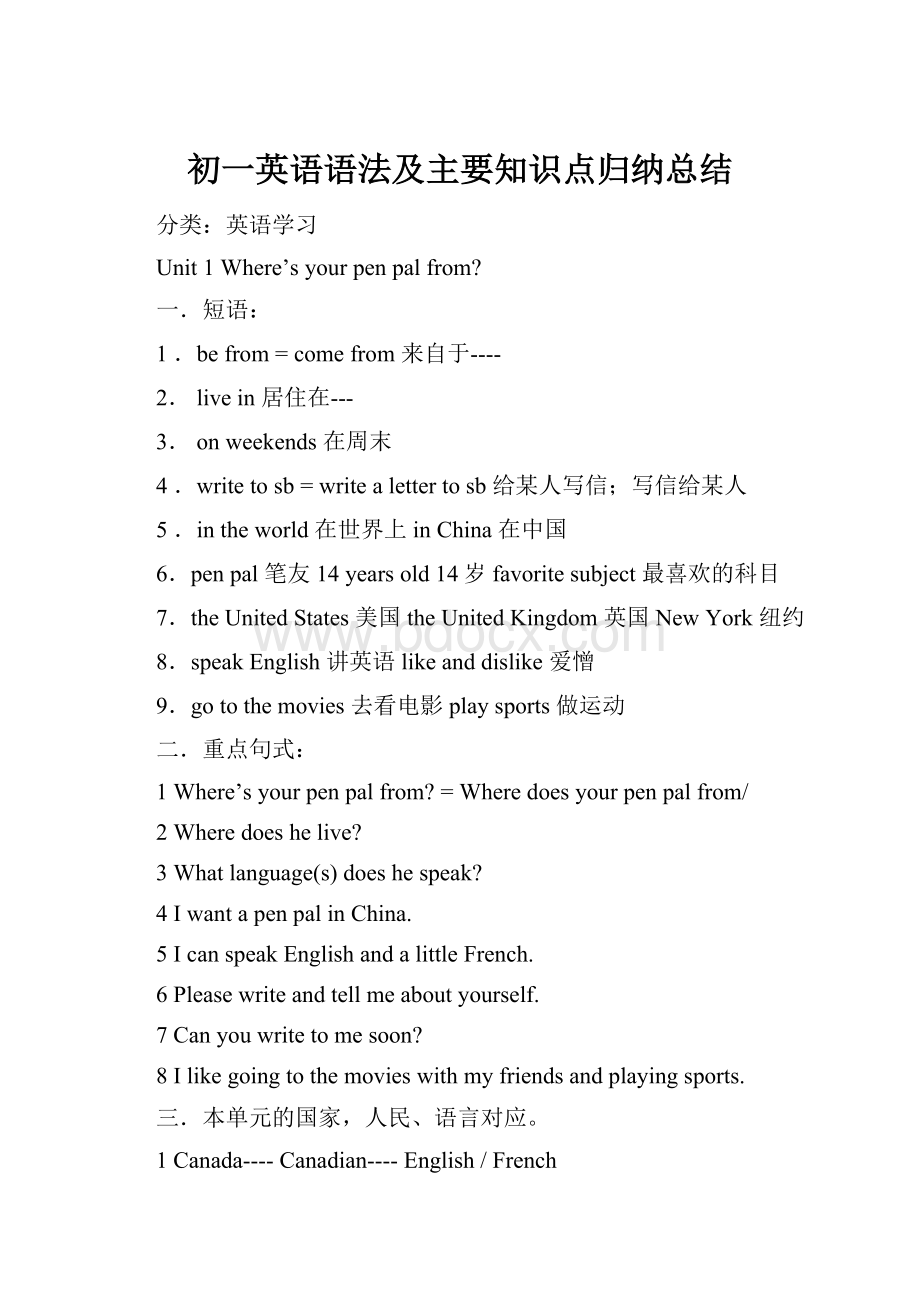初一英语语法及主要知识点归纳总结.docx
《初一英语语法及主要知识点归纳总结.docx》由会员分享,可在线阅读,更多相关《初一英语语法及主要知识点归纳总结.docx(29页珍藏版)》请在冰豆网上搜索。

初一英语语法及主要知识点归纳总结
分类:
英语学习
Unit1Where’syourpenpalfrom?
一.短语:
1.befrom=comefrom来自于----
2.livein居住在---
3.onweekends在周末
4.writetosb=writealettertosb给某人写信;写信给某人
5.intheworld在世界上inChina在中国
6.penpal笔友14yearsold14岁favoritesubject最喜欢的科目
7.theUnitedStates美国theUnitedKingdom英国NewYork纽约
8.speakEnglish讲英语likeanddislike爱憎
9.gotothemovies去看电影playsports做运动
二.重点句式:
1Where’syourpenpalfrom?
=Wheredoesyourpenpalfrom/
2Wheredoeshelive?
3Whatlanguage(s)doeshespeak?
4IwantapenpalinChina.
5IcanspeakEnglishandalittleFrench.
6Pleasewriteandtellmeaboutyourself.
7Canyouwritetomesoon?
8Ilikegoingtothemovieswithmyfriendsandplayingsports.
三.本单元的国家,人民、语言对应。
1Canada----Canadian----English/French
2France------French------French
3Japan------Japanese----Japanese
4Australia----Australian-----English
5theUnitedStates------American----English
6theUnitedKingdom---British-----Enghish
Unit2Where’sthepostoffice?
一.Askingways:
(问路)
1.Whereis(thenearest)……?
(最近的)……在哪里?
2.Canyoutellmethewayto……?
你能告诉我去……的路吗?
3.HowcanIgetto……?
我怎样到达……呢?
4.Isthere……nearhere/intheneighborhood?
附近有……吗?
5.Whichisthewayto……?
哪条是去……的路?
二.Showingtheways:
(指路)
1.Gostraightdown/alongthisstreet.沿着这条街一直走。
2.Turnleftatthesecondturning.在第二个路口向左转。
3.Youwillfinditonyourright.你会在你右手边发现它。
4.Itisaboutonehundredmetresfromhere.离这里大约一百米远。
5.You’dbettertakeabus.你最好坐公交车去。
(You’dbetter+动词原形)
三.词组
1.acrossfrom……在……的对面acrossfromthebank在银行的对面
2.nextto……紧靠……nexttothesupermarket紧靠超市
3.between……and……在……和……之间
betweentheparkandthezoo在公园和动物园之间
among表示位于三者或三者以上之间
4.infrontof……在……前面Thereisatreeinfrontoftheclassroom.
课室前面有棵树。
inthefrontof……在……(内)的前部Thereisadeskinthefrontoftheclassroom.
课室内的前部有张桌子。
5.behind……在……后面behindmyhouse在我家后面
6.turnleft/right向左/右拐
ontheleft/rightof……在某物的左/右边ontheleftofourschool在我们学校的左边
onone’sleft/right在某人的左/右边onmyleft在我左边
7.gostraight一直走
8.down/along……沿着……(街道)down/alongCenterStreet沿着中央街
9.intheneighborhood=nearhere在附近
10welcometo……欢迎来到……
11.take/haveawalk散步
12.thebeginningof…………的开始,前端
atthebeginningof……在……的开始,前端
inthebeginning起初,一开始
13.havefun=haveagoodtime=enjoyoneself玩得开心,过得愉快
我昨天玩得很开心。
Ihadfunyesterday.
Ihadagoodtimeyesterday.
Ienjoyedmyselfyesterday.
14.haveagoodtrip旅途愉快
15.takeataxi坐出租车
16.到达:
getto+地方gethere/there/home到这/那/家
arrivein+大地方IarriveinBeijing.
arriveat+小地方Iarriveatthebank.
reach+地方
17.goacross从物体表面横过goacrossthestreet横过马路
gothrough从空间穿过gothroughtheforest穿过树林
18.on+街道的名称。
Eg:
onCenterStreet
at+具体门牌号+街道的名称Eg:
at6CenterStreet
三.重难点解析
1.enjoydoingsth享受做某事的乐趣,喜爱做某事
Ienjoyreading.我喜爱读书。
到目前为止,我们学了两个特殊的动词finish和enjoy,都是要带doing.
Ifinishcleaningtheroom.我扫完了这间屋子。
2.hopetodosth希望做某事Ihopetopassthisexam.我希望通过这次考试。
hope+从句Ihopetomorrowwillbefine.我希望明天将会晴朗。
(从句即是一个小句子,这个小句子又放在大句子中,从属于大句子,所以叫从句。
如tomorrowwillbefine是一个从句,它又放在Ihope的后面,形成句中有句。
)
3.if引导一个表示假设的句子。
IfIhavemuchmoney,Iwillgotothemoon.如果我有许多钱,我就会去月球。
Ifyouarehungry,youcanbuysomefoodinthesupermarket.
如果你饿了的话,你可以在超市买一些食物。
四.本单元的反义词、近义词配对
1new—old2quiet---busy3dirty---clean4big----small
Unit3Whydoyoulikekoalabears?
一.重点词组
eatgrasseatleavesbequietveryshyverysmartverycute
playwithherfriendskindofSouthAfricaotheranimals
atnightinthedayeverydayduringtheday
二.交际用语
1.Whydoyoulikepandas?
Becausethey’reveryclever.
2.Whydoeshelikekoalas?
Becausethey’rekindofinteresting.
3.Wherearelionsfrom?
TheyarefromSouthAfrica.
4.Whatotheranimalsdoyoulike?
Ilikedogs,too.
Why?
Becausethey’refriendlyandclever.
5.Mollylikestoplaywithherfriendsandeatgrass.
6.She’sveryshy.
7.HeisfromAustralia.
8.Hesleepsduringtheday,butatnighthegetsupandeatsleaves.
9.Heusuallysleepsandrelaxes20hourseveryday.
10.Let’sseethepandasfirst.
11.They’rekindofinteresting.
12.Whatotheranimalsdoyoulike?
13.Whydoyouwanttoseethelions?
三.重点难点释义
1、kindof有点,稍微
Koalabearsarekindofshy.考拉有点害羞。
kind还有“种类”的意思
如:
各种各样的allkindsof
Wehaveallkindsofbeautifulflowersinourschool.
2、Chinan.中国African.非洲
China和Africa都是专有名词,首字母都应该大写,而且和介词in连用。
TherearemanykindsoftigersinChina.
TherearemanykindsofscaryanimalsinAfrica.
3、friendlyadj.友好的,和蔼可亲的
它是名词friend的形容词形式,常常和be动词连用,befriendly。
ThepeopleinChengduareveryfriendly.
4、withprep.跟,同,和…在一起
Iusuallyplaychesswithmyfather.
注意区别与and的用法,and通常用于连接主语或宾语,连接主语时,
如果有I,I通常放在and之后,如:
MyfatherandIusuallyplaychesstogether.
Playwith“和…一起玩耍”“玩…”
Ioftenplaywithmypetdog.
Don’tplaywithwater!
5、day和night是一对反义词,day表示白天或一天,night表示夜或夜晚。
通常说intheday,duringtheday,atnight。
Koalabearsoftensleepduringthedayandeatleavesatnight.
6、leafn.叶子
复数形式为:
leaves,类似的变化还有:
wife—wives,wolf—wolves,
knife—knives等。
7、hourn.小时;点钟
hour前边通常加上冠词an表示“一个小时”,即:
anhour。
Thereare24hoursinadayand60minutesinanhour.
8、befrom来自…
befrom=comefrom
PandasarefromChina.=PandascomeformChina.
9、meatn.(食用的)肉,为不可数名词,表示“许多”时,使用much来修
饰,即:
muchmeat
Heeatsmuchmeateveryday.
10、grassn.草,为不可数名词,表示“许多”时,使用much来修饰,即:
muchgrass。
Thereismuchgrassontheplayground.
四.语法知识
特殊疑问句通常以“what”、“who”、“which”、“when”、“where”、“how”、“howold”、“howmany”等开头,对某一具体问题进行提问。
特殊疑问句的基本构成有两种情况:
1.疑问句+一般疑问句结构。
这是最常见的情况。
例如:
What’syourgrandfather’stelephonenumber?
你爷爷的电话号码是多少?
Whoisthatboywithbigeyes?
那个大眼睛的男孩是谁?
Whichseasondoyoulikebest?
你最喜欢哪个季节?
Whenishegoingtoplaythepiano?
他什么时候弹钢琴?
Wheredoeshelive?
他住在哪儿?
Howareyou?
你好吗?
Howoldareyou?
你多大了?
Howmanybrothersandsistersdoyouhave?
你有几个兄弟姐妹?
2.疑问句+陈述句结构。
这时疑问词作主语或修饰主语。
例如:
Whoisondutytoday?
今天谁值日?
Whichmanisyourteacher?
哪位男士是你的老师?
我们学过的What/Howabout+名词/代词+其他?
也是特殊疑问句,它是一种省略结构。
例如:
IlikeEnglish.What/Howaboutyou?
我喜欢英语。
你呢?
Whataboutplayingbasketball?
打篮球怎么样?
Unit4Iwanttobeanactor.
一.短语:
1wanttodosth想要作某事
2givesbsth=givesthtosb给某人某物/把某物给某人
3helpsbdosth帮助某人作某事Eg:
Iwanttohelpmymotherdosomehouseworkathome.
4helpsbwithsth帮助某人谋事Eg:
Iwanttohelpmymotherwithsomehouseworkathome
5intheday在白天
6atnight在晚上
7talkwith/tosb和----谈话
8bebusydoingsth忙于做某事Eg:
Heisbusylisteningtotheteacher.
9inahospital在医院l
10work/studyhard努力工作
11EveningNewspaper晚报
二.重点句式及注意事项:
1询问职业的特殊疑问词是what;有三种主要句式
①What+is/are+sb?
②What+does/do+sb+do?
③What+is/are+名词所有格/形容词性物主代词+job?
2Peoplegivemetheirmoneyorgettheirmoneyfromme.
3SometimesIworkinthedayandsometimesatnight.
4Iliketalkingtopeople.
5Iworklate.I’mverybusywhenpeoplegoouttodinners.
6Wheredoesyoursisterwork?
7thenwehaveajobforyouasawaiter.
8Doyouwanttoworkforamagazine?
Thencomeandworkforusasareporter.
9Doyouliketoworkeveningsandweekends?
10Weareaninternationalschoolforchildrenof5-12.
三.本单元中的名词复数。
1policeman---policemen2womandoctor-----womendoctors3thief-----thieves
首先主谓宾结构Ihaveanapple.
其次定状补Ireallyhaveabigapple.
really做have的状语状语修饰动词动词一般就是谓语动词
big做apple的定语定语修饰名词名词一般是主语或宾语
最后主系表结构它与主谓宾很相似只不过谓语动词时系动词最常见的是be动词及其变形Iamastudent。
主语通常用于句子开端,主要有:
i,you,he,she,it,we,they,但it有时用作形式主语,表特指。
谓语,通常放在主语之后,一般是动词,表示“某某人在。
。
。
”
宾语,通常放在谓语之后,一般是主语的宾格。
有时候是人,有时候是物。
定语,状语,通常是从句。
定语从句:
常有关系代词that\which\who\whoes,关系副词when\where\why.通常选择关系词的步骤是:
1、确定先行词2.确定关系词.
主系表:
主,就是主语。
系,特指系动词,就是说当句子中没有谓语时,用系动词来代替。
表,修饰系动词用。
1、名词
A)、名词的数
我们知道名词可以分为可数名词和不可数名词,而不可数名词它没有复数形式,但可数名词却有单数和复数之分,复数的构成如下:
一)在后面加s。
如:
fathers,books,Americans,Germans,apples,bananas
二)x,sh,ch,s,tch后加es。
如:
boxes,glasses,dresses,watches,wishes,faxes
三)1)以辅音字母加y结尾的变y为i再加es如:
baby-babies,family-families,duty-duties,comedy-comedies,documentary-documentaries,story-stories
2)以元音字母加y结尾的直接加s。
如:
day-days,boy-boys,toy-toys,key-keys,ways
四)以o结尾加s(外来词)。
如:
radios,photos,但如是辅音加o的加es:
如:
tomatoes西红柿,potatoes马铃薯
五)以f或fe结尾的变f为v再加es(s)。
如:
knife-knives,wife-wives,half-halves,shelf-shelves,leaf-leaves,yourself-yourselves
六)单复数相同(不变的)有:
fish,sheep,deer鹿子,Chinese,Japanese
七)一般只有复数,没有单数的有:
people,pants,shorts,shoes,glasses,gloves,clothes,socks
八)单词形式不变,既可以是单数也可以是复数的有:
police警察局,警察,class班,同学,family家,家庭成员
九)合成的复数一般只加主要名词,多数为后一个单词。
如:
actionmovie-actionmovies,penpal-penpals;但如果是由man或woman所组成的合成词的复数则同时为复数。
如:
mandoctor-mendoctors,womanteacher-womenteachers
十)有的单复数意思不同。
如:
fish鱼fishes鱼的种类,paper纸papers报纸,卷子,论文,work工作works作品,工厂,glass玻璃glasses玻璃杯,眼镜,orange桔子水oranges橙子,light光线lights灯,people人peoples民族,time时间times时代,次数,chicken鸡肉chickens小鸡
十一)单个字母的复数可以有两种形式直接加s或’s。
如:
Is(I’s),Ks(K’s)。
但如是缩略词则只加s。
如:
IDs,VCDs,SARs
十二)特殊形式的有:
child-children,man-men,woman-women,foot-feet,mouse-mice,policeman-policemen,Englishman-Englishmen
B)名词的格
当我们要表示某人的什么东西或人时,我们就要使用所有格形式。
构成如下:
一)单数在后面加’s。
如:
brother’s,Mike’s,teacher’s
二)复数以s结尾的直接在s后加’,如果不是以s结尾的与单数一样处理。
如:
Teachers’Day教师节,classmates’;Children’sDay六一节,Women’sDay三八节
三)由and并列的名词所有时,如果是共同所有同一人或物时,只加最后一个’s,但分别拥有时却分别按单数形式处理。
如:
MikeandBen’sroom迈克和本的房间(共住一间),Mike’sandBen’srooms迈克和本的房间(各自的房间)
2、代词
项目人称代词物主代词指示代词反身代词
人称主格宾格形容词名词性
第一人称单数Imemyminemyself
复数weusouroursourselves
第二人称单数youyouyouryoursyourself
复数youyouyouryoursyourselves